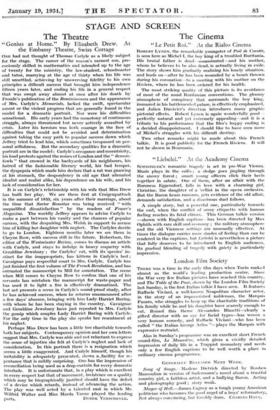STAGE AND SCREEN
The Theatre
" Genius at Home." By Elizabeth Drew. At the Embassy Theatre, Swiss Cottage
Osta had not thought of Thomas Carlyle as a likely subject for the stage. The career of the mason's earnest son, pre- cociously skilled in mathematics and intended up to the age of twenty for the ministry, the law-student, schoolmaster and tutor, marrying at the age of thirty when his life was still unsettled, achieving by unswerving fidelity to his own principles a difficult success that brought him independence fifteen years later, and ending his life in a general respect that was swept away almost at once after his death by Froude's publication of the Reminiscences and the appearance of Mrs. Carlyle's Memorials, lacked the swift, spectacular ascent or the violent progress that are generally found in the model for a dramatic portrait. Nor were his difficulties sensational. His early years had the monotony of continuous struggle, always threatened but never actively assaulted by crisis. Later his heroism was both courage in the face of difficulties that could not be avoided and determination against taking the easy path to popular success down which Jeffrey tried to lead him, which sometimes trespassed on per- sonal selfishness. But the secondary qualities for a dramatic portrait are in the model: Carlyle's arrogance and eccentricity, his loud protests against the noises of London and the " demon- fowls " that crowed in the backyards of his neighbours, his hatred of the fashionable literary world, his bad temper, the dyspepsia which made him declare that a rat was gnawing at his stomach, the despondency in old age that alienated idealist and realist alike, his dependence on his wife, and his lack of consideration for her.
It is on Carlyle's relationship with his wife that Miss Drew has built her play. We see them first at Craigenputtock in the summer of 1833, six years after their marriage, about the time that Sarlor Resartus was being received " with unqualified dissatisfaction " by the readers of Fraser's Magazine. The worldly Jeffrey appears to advise Carlyle to make a pact between his vanity and the chances of popular sudeess, with the despairing Mrs. Welsh in support to accuse him of killing her daughter with neglect. The Carlyles decide to go to London. Eighteen months later we see them in Cheyne Row, with success still in the future. Robertson, the editor of the Westminster Review, comes to discuss an article with Carlyle, and stays to indulge in heavy coquetry with Geraldine Jewsbury ; the Carlyles' cat, with its 'species' in- stinct for the inappropriate, has kittens in Carlyle's bed ; Cavaignac pays respectful court to Mrs. Carlyle. Carlyle has just finished the first volume of The French Revolution, and has entrusted the manuscript to Mill for annotation. The scene when Mill comes to Cheyne Row to confess that one of his servants has mistaken the manuscript for waste-paper and has used it to light a fire is effectively dramatized. The last act presents a scene in Carlyle's sound-proof study, after he has achieved success, when he returns unannounced after a few days' absence, bringing with him Lady Harriet Baring, with whom he has been staying in the country. Cavaignac and Geraldine Jewsbury have just repeated to Mrs. Carlyle the gossip which couples Lady Harriet Baring with Carlyle. For the only time in the play she speaks her resentment at his neglect.
Perhaps Miss Drew has been a little too charitable towards both her subjects. Contemporary opinion and her own letters suggest that Mrs. Carlyle was able and not reluctant to express the sense of injustice she felt at Carlyle's neglect and lack of consideration. In this portrait there is a resignation which seems a little exaggerated. And Carlyle himself, though his irritability is adequately presented, shows a. facility for re- pentance that is mildly surprising. One has the impression of reconciliation-being used as a drop-curtain for every domestic interlude. It is unfortunate that, in a play which is excellent in every respect but that of movement, insistence on a quality which may be biographically justified should have the defect of a device which retards, instead of advancing the action. The play was well acted by a talented cast in which Mr. Wilfrid Walter and Miss Marda Vanne played the leading








































 Previous page
Previous page